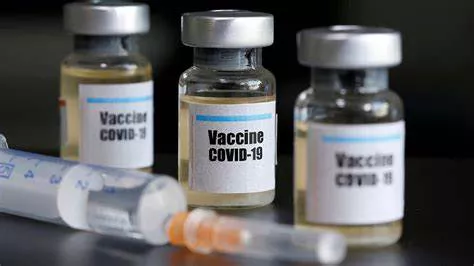In recent times, as the world grapples with the COVID-19 pandemic, the development and distribution of vaccines have been crucial in combating the spread of the virus. However, along with the benefits of vaccination, there have been reports of rare side effects, one of which is myocarditis. This article delves into the topic of how common myocarditis is from the COVID vaccine, examining the risk factors, incidence rates, symptoms, treatment options, and overall safety considerations.
Understanding Myocarditis:
Myocarditis is a condition characterized by inflammation of the heart muscle (myocardium). It can result from various causes, including viral infections, autoimmune diseases, and certain medications. The hallmark of myocarditis is inflammation that can weaken the heart’s ability to pump blood effectively, leading to symptoms such as chest pain, shortness of breath, fatigue, and in severe cases, heart failure.
Myocarditis And COVID-19 Vaccines:
Several COVID-19 vaccines, including mRNA vaccines like Pfizer-BioNTech and Moderna, have been associated with cases of myocarditis, particularly in younger individuals. Myocarditis following COVID vaccination is referred to as vaccine-induced myocarditis.
See Also: How Long Can You Live with 20 Heart Function
Incidence Rates And Risk Factors:
The incidence of myocarditis following COVID vaccination is considered rare but has been observed more frequently among certain demographics, such as younger males, particularly after the second dose of mRNA vaccines. Studies and surveillance data have provided insights into the risk factors associated with vaccine-induced myocarditis, including age, sex, previous COVID-19 infection, and genetic predispositions.
Symptoms And Diagnosis:
The symptoms of myocarditis following COVID vaccination are similar to those caused by other triggers. Patients may experience chest pain, palpitations, shortness of breath, fatigue, and flu-like symptoms. Diagnosis often involves a combination of medical history review, physical examination, imaging tests like echocardiography and cardiac MRI, and laboratory investigations to assess inflammation markers.
Treatment And Management:
The management of vaccine-induced myocarditis typically involves supportive care, such as rest, pain relief, and close monitoring of cardiac function. In severe cases, hospitalization may be required for further evaluation and treatment, which may include medications to reduce inflammation and support heart function. Long-term follow-up is essential to monitor for any lingering effects on cardiac health.
Safety Considerations And Public Health Response:
Despite the rare occurrence of myocarditis post-COVID vaccination, regulatory agencies and public health authorities emphasize the overall safety and benefits of vaccination in preventing severe COVID-19 illness, hospitalization, and death.
Robust surveillance systems continue to monitor vaccine safety, identify potential risks, and implement appropriate measures to ensure public confidence in vaccination programs.
How Long After The COVID Vaccine Do People Get Myocarditis?
Myocarditis after COVID vaccination is rare but can occur, typically within a few days to a couple of weeks after receiving the vaccine. The timing can vary depending on the individual and the specific vaccine. For example, cases of myocarditis linked to mRNA COVID vaccines like Pfizer-BioNTech and Moderna have been reported to occur within a few days to a week after vaccination, with most cases appearing within four days after the second dose. However, it’s essential to note that the risk of myocarditis after COVID vaccination is extremely low compared to the risks associated with COVID-19 infection itself. If you’re concerned about this potential side effect, it’s best to discuss it with your healthcare provider for personalized guidance.
What Are The Odds of Getting Myocarditis After COVID?
The odds of getting myocarditis after receiving a COVID-19 vaccine are very low. According to data from various health agencies and studies, the risk of myocarditis following COVID vaccination, particularly with mRNA vaccines like Pfizer-BioNTech and Moderna, is estimated to be around 1 to 5 cases per million doses administered in males under 30 years old.
The risk appears to be higher in this age group and more commonly associated with the second dose of the mRNA vaccines.
It’s important to note that while myocarditis is a potential side effect of COVID vaccination, the overall risk is significantly lower than the risks associated with COVID-19 infection itself, especially severe complications like myocarditis or other cardiovascular complications that can occur as a result of the virus.
Health authorities continuously monitor vaccine safety and provide updates on any new findings regarding potential side effects, including myocarditis. If you have specific concerns about vaccine side effects, it’s recommended to consult with your healthcare provider for personalized advice and information based on your individual health status and risk factors
Conclusion:
In conclusion, myocarditis following COVID vaccination is a rare but recognized adverse event, particularly among younger individuals. Understanding the risk factors, recognizing symptoms, timely diagnosis, and appropriate management are crucial in addressing vaccine-induced myocarditis. Public health efforts to promote vaccination while ensuring safety and transparency in reporting and managing adverse events are essential pillars in navigating the ongoing pandemic.
This article aims to provide an informative overview of how common myocarditis is from the COVID vaccine, highlighting the importance of balanced risk assessment, informed decision-making, and ongoing research to optimize vaccination strategies and promote public health.

